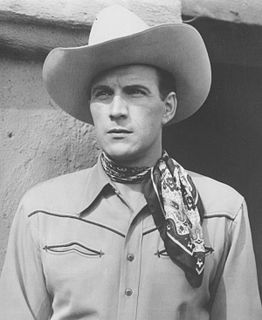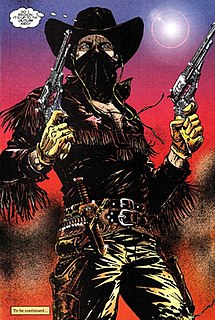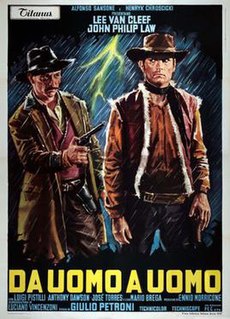
Gunslingers or gunfighters were individuals in the American Old West who gained a reputation of being dangerous with a gun and participated in gunfights and shootouts. Today, the term "gunslinger" is more or less used to denote someone who is quick on the draw with a pistol, but can also refer to riflemen and shotgun messengers. The gunfighter is also one of the most popular characters in the Western genre and has appeared in associated films, video games, and literature.

Frederick Schiller Faust was an American author known primarily for his Western stories using the pseudonym Max Brand. He also created the popular fictional character of young medical intern Dr. James Kildare for a series of pulp fiction stories. His Kildare character was subsequently featured over several decades in other media, including a series of American theatrical movies by Paramount Pictures and Metro-Goldwyn-Mayer (MGM), a radio series, two television series, and comics. Faust's other pseudonyms include George Owen Baxter, Evan Evans, George Evans, Peter Dawson, David Manning, John Frederick, Peter Morland, George Challis, Peter Ward, Frederick Faust and Frederick Frost. As George Challis, Faust wrote the "Tizzo the Firebrand" series for Argosy magazine. The Tizzo saga was a series of historical swashbuckler stories, featuring the titular warrior, set in Renaissance Italy.

George Glenn Strange was an American actor who mostly appeared in Western films and was billed as Glenn Strange. He is best remembered for playing Frankenstein's monster in three Universal films during the 1940s and for his role as Sam Noonan, the bartender on CBS's Gunsmoke television series.
The revisionist Western is a sub-genre of the Western film. Designated a post-classical variation of the traditional Western, the revisionist subverts the myth and romance of the traditional by means of character development and realism to present a less simplistic view of life in the "Old West". While the traditional Western always embodies a clear boundary between good and evil, the revisionist Western does not.

Tom Tyler was an American actor known for his leading roles in low-budget Western films in the silent and sound eras, and for his portrayal of superhero Captain Marvel in the 1941 serial film The Adventures of Captain Marvel. Tyler also played Kharis in 1940's The Mummy's Hand, a popular Universal Studios monster film.
Kid Colt is the name of two fictional characters appearing in American comic books published by Marvel Comics. The first is a cowboy whose adventures have taken place in numerous western-themed comic book series published by Marvel. The second is a cowboy-themed horse-like superhero.

The Outlaw Kid is a fictional Western hero in comic books published by Marvel Comics. The character originally appeared in the company's 1950s iteration, Atlas Comics. A lesser-known character than the company's Kid Colt, Rawhide Kid or Two-Gun Kid, he also starred in a reprint series in the 1970s and a short-lived revival.

The Gunfighter is a 1950 American Western film directed by Henry King and starring Gregory Peck, Helen Westcott, Millard Mitchell and Karl Malden. It was written by screenwriters William Bowers and William Sellers, with an uncredited rewrite by writer and producer Nunnally Johnson, from a story by Bowers and screenwriter and director Andre DeToth. The film was the second of King's six collaborations with Peck.

Death Rides a Horse is a 1967 Italian Spaghetti Western directed by Giulio Petroni, written by Luciano Vincenzoni and starring Lee Van Cleef and John Phillip Law.

Richard Theodore Adams was an American film actor who appeared in nearly 200 films between 1926 and 1952.

Leonard Miles "Bud" Osborne was an American film actor. He appeared in more than 600 films and television programs between 1912 and 1963. He also was known as Lenny Osborne.
Alan James was an American film director and screenwriter. He directed more than 70 films between 1916 and 1943. He also wrote for more than 60 films between 1916 and 1951. He was born in Port Townsend, Washington and died in Hollywood, California.

George Chesebro was an American film actor. He appeared in more than 400 films between 1915 and 1954. He was born in Minneapolis, Minnesota and died in Los Angeles, California.
Chick Bowdrie is a character depicted in numerous Western short stories authored by writer Louis L'Amour.

Albert Lawrence Bates was an American bank robber and burglar during the 1920s and 1930s. He used a number of different aliases during his criminal career including George Davis, George Harris and J.B. King. He was the longtime partner of George "Machine Gun" Kelly. He also took part in the kidnapping of oil magnate Charles Urschel in July of 1933.
Clarence Oliver Drake was an American film/television director, screenwriter, producer and actor who was most active in the Western genre. Though Drake began his career as an actor, he is best known as a prolific screenwriter and director of low-budget Western films. Drake was most active in the 1930s and 1940s, although he continued writing and directing films until 1974.
Walter John "Walt" Coburn was an American writer of Westerns. Coburn was born in White Sulphur Springs, Montana Territory, the son of Robert Coburn Senior, the founder of the noted Circle C Ranch located south of Malta.

John Merton was an American film actor. He appeared in more than 250 films between 1927 and 1959, mostly as a villain.
Matt Warner was a notable figure from the American Old West who was a farmer, cowboy, rancher, ferryman, cattle rustler, bank robber, justice of the peace, lawman, and bootlegger. Born Erastus Christiansen, he changed his name in his teens when he became an outlaw. and some sources use Willard Erastus Christiansen. In written works about him, his surname is often spelled Christianson. His most prevalent alias was Matt Warner. He was also called "Ras Lewis" and "The Mormon Kid".</ref>
Billy the Kid Outlawed is a 1940 American Western film directed by Sam Newfield and written by Oliver Drake. It stars Bob Steele as gunfighter "Billy the Kid", Al St. John as his sidekick "Fuzzy" Jones and Carleton Young as Jeff Travis, with Louise Currie and John Merton. The film was released on July 20, 1940, by Producers Releasing Corporation.











